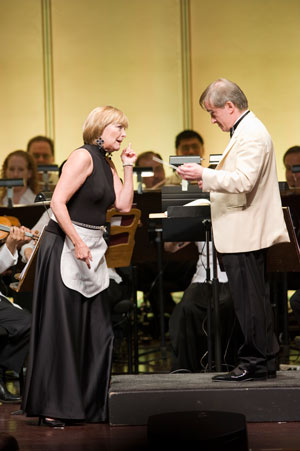Facing Forward
By Martin Bernheimer
Frederica von Stade has enjoyed a unique, lengthy, wide-ranging career that has brought her fame and, one hopes, fortune. She has always been a favorite with international aficionados who appreciate style, quality, sensitivity, and versatility. Even admirers who do not happen to know her personally flash her nickname, “Flicka.”
She is, of course, an extraordinary opera star, first and foremost. That occupation, however, has never been a full-time obsession.
In addition to her work in the world’s best musical theaters, she has been a fixture at various presidential events. At the inauguration of Jimmy Carter, she sang “Take Care of This House” from 1600 Pennsylvania Avenue by Leonard Bernstein and Alan Jay Lerner. Demonstrating what might be regarded as political versatility—or neutrality—she also sang at the 50th Presidential Inaugural Gala, which marked the second inauguration of Ronald Reagan. Not incidentally, she was warmly introduced on that occasion by the comic actor Tony Randall, and her surprisingly sophisticated vehicle turned out to be an aria from Meyerbeer’s Les Huguenots. She also illuminated the opening ceremonies of the 2002 Winter Olympics in Salt Lake City, and she sang with the Mormon Tabernacle Choir at the Cultural Olympiad held in conjunction with the games.
She got around, musically speaking. And she still does.
After ending a long and extraordinarily successful period centered on the so-called standard opera and concert repertory, von Stade expanded her realm of activity with contemporary explorations, many challenges created specifically for her. It is true, she admits, that the focus of her professional life has changed. “But,” she adds, “that is not because of some deliberate plan. I think it is a question of blind luck and really just saying yes to ideas that were proposed to me. I’ve loved every minute of these different adventures and am so grateful for the opportunities.”
 Her career at the Metropolitan Opera spanned 300 performances, many of them in so-called Hosenrollen—“trouser roles.” She looked great in pants, and had what seemed like an easy knack for impersonating adolescent boys, from Octavian in Richard Strauss’s Der Rosenkavalier to Nicklausse in Offenbach’s The Tales of Hoffmann to Hänsel in Humperdinck’s Hänsel and Gretel to Cherubino in Mozart’s The Marriage of Figaro. With that company alone she sang Mozart’s amorous pageboy 48 times, the second most by any mezzo in its history (excepting Mildred Miller, who played the part 61 times).
Her career at the Metropolitan Opera spanned 300 performances, many of them in so-called Hosenrollen—“trouser roles.” She looked great in pants, and had what seemed like an easy knack for impersonating adolescent boys, from Octavian in Richard Strauss’s Der Rosenkavalier to Nicklausse in Offenbach’s The Tales of Hoffmann to Hänsel in Humperdinck’s Hänsel and Gretel to Cherubino in Mozart’s The Marriage of Figaro. With that company alone she sang Mozart’s amorous pageboy 48 times, the second most by any mezzo in its history (excepting Mildred Miller, who played the part 61 times).
Von Stade made her debut, most modestly, in 1970 at age 25. Her vehicle: the fleeting ensemble duties of the Third Genie in Mozart’s The Magic Flute. She mustered her Met farewell, 31 years later, in the title role of Lehár’s The Merry Widow, opposite the romantic tenor Plácido Domingo. It seems silly to ask, but one wonders if she harbors any career regrets.
“No regrets whatsoever,” she replies, her tone emphatic. “I loved it from the day I walked into the Met. It was like a magic experience that I never could have imagined. In the beginning, I barely knew how to get around the opera house, much less the stage. I was taught by masters in every corner—directors, conductors, artists, and nearly every member of the Met family—and it was really a family when I was first there.
“There were the wonderful ladies, Winnie and Mary at the reception desk when you walked in; Jimmy Pinto, who made us all look marvelous; Nina Lawson, who managed the wig department with such ease and good will; and dear Rosie, who took care of the costumes. If you saw a costume walking down the hall with no one holding it, you could be sure that Rosie was under there somewhere delivering it to a dressing room. I always think that it takes many, many people to make an opera singer, hundreds of supporting, kind, gifted people who put all their talents into us, often without recognition.”
Did she follow a specific career- progress plan? The answer is firm: “That’s just the way it happened, and I loved the beginning as much as the end.” Actually, she claims exultation regarding her grand finale. “Can it get better than waltzing out the door with Plácido?”
One of the secrets of her remarkable success must entail careful choice of repertory, and cautious avoidance of assignments that might invite vocal stress or strain. She did, however, attempt one role at the Met for which she hardly seemed predestined: Adalgisa, the seconda donna in Bellini’s Norma. She was smart enough to sing it lyrically in 1975, never pushing for heroism beyond her norm. Donal Henahan, chief critic of the New York Times, found her “sensitive portrayal the best thing about this Norma.” He conceded that “her voice sometimes did not seem robust enough ... but she conveyed shades of emotion in a recognizably Bellinian style.” Still, he did note that the mezzo-soprano was oddly paired with Rita Hunter, a heroic Wagnerian soprano seemingly miscast in the title role.
“I loved attempting Adalgisa,” von Stade now recalls with classic candor, “but that’s what it was: an attempt. I was always in love with the music, and I was asked. I never did it anywhere else. I learned my lesson.”
 For her Ravinia program on September 10 she shares the stage with Laurie Rubin, a most successful, younger mezzo-soprano who has been blind since birth. In 2012, Seven Stories Press published her memoir, Do You Dream in Color? Insights from a Girl Without Sight. In it she demonstrates her determination to surpass and redefine popular expectations. According to her website, Rubin continues to hope that her story will resonate with young people contemplating two fundamental questions: “Who am I?” and “Where do I fit in?”
For her Ravinia program on September 10 she shares the stage with Laurie Rubin, a most successful, younger mezzo-soprano who has been blind since birth. In 2012, Seven Stories Press published her memoir, Do You Dream in Color? Insights from a Girl Without Sight. In it she demonstrates her determination to surpass and redefine popular expectations. According to her website, Rubin continues to hope that her story will resonate with young people contemplating two fundamental questions: “Who am I?” and “Where do I fit in?”
Von Stade, who praises the book as “wonderful,” finds that it “shows the same clarity, honesty, and devotion that Laurie has always had with her art.” Pola Rosen, publisher of Education Update, seconds the critical motion: “Laurie Rubin’s memoir should be required reading in that it underscores the triumph of the human spirit. Rubin serves as a role model for all of us, whether or not we face a disability.”
The projected musical menu for the von Stade–Rubin duo at Ravinia spans virtually everything from soup to nuts, from Mozart to Stephen Sondheim. “Here,” von Stade confirms, “we go back and forth. I would have loved to have put together a program that featured the differences in our ages and experience and all. We did try to do that to a certain extent. I met Laurie when she was 16 and have watched her grow and mature over the last 10 or 15 years. The first time I sang with her, I invited her to join me for a benefit for a marvelous organization called the Foundation to Fight Blindness. I became involved as one of my daughter’s dear friends had a disease that has rendered her nearly completely blind and deaf today. Then over the years I kept in touch with Laurie. She has never ceased to develop her very special talents.”
 The next major challenge on von Stade’s agenda is an opera by Jake Heggie called Great Scott, which receives its world premiere at the Dallas Opera in October. The libretto, written by Terrence McNally, concerns an opera star who returns to her hometown to save the struggling ensemble that had launched her career. Opening night, unfortunately, falls on the same night as the home team’s first Super Bowl. Problems ensue as the woman who runs the opera company is also married to the owner of the football team. The central role falls to Joyce DiDonato, conspicuously supported by von Stade, who expresses elation at the prospect. “Great Scott,” she declares, “is sensational. We did a workshop in April and it was just wonderful. Jake has created another wonderful work, full of pathos, humor, great music, and a hysterical libretto—to say nothing of the thrill of working with Joyce and a marvelous cast, director, and on and on. I play the lady who runs the opera company, and I have a lovely little duet with Joyce when we reminisce about how much we loved to listen to the Met broadcasts. Jake has been so good to me over the years, and my admiration for him is only surpassed by my affection for every corner of his soul.” [Not coincidentally, several of Heggie’s songs feature on her September program at Ravinia, including selections from a song cycle the festival commissioned from him in 2007, Facing Forward/ Looking Back.]
The next major challenge on von Stade’s agenda is an opera by Jake Heggie called Great Scott, which receives its world premiere at the Dallas Opera in October. The libretto, written by Terrence McNally, concerns an opera star who returns to her hometown to save the struggling ensemble that had launched her career. Opening night, unfortunately, falls on the same night as the home team’s first Super Bowl. Problems ensue as the woman who runs the opera company is also married to the owner of the football team. The central role falls to Joyce DiDonato, conspicuously supported by von Stade, who expresses elation at the prospect. “Great Scott,” she declares, “is sensational. We did a workshop in April and it was just wonderful. Jake has created another wonderful work, full of pathos, humor, great music, and a hysterical libretto—to say nothing of the thrill of working with Joyce and a marvelous cast, director, and on and on. I play the lady who runs the opera company, and I have a lovely little duet with Joyce when we reminisce about how much we loved to listen to the Met broadcasts. Jake has been so good to me over the years, and my admiration for him is only surpassed by my affection for every corner of his soul.” [Not coincidentally, several of Heggie’s songs feature on her September program at Ravinia, including selections from a song cycle the festival commissioned from him in 2007, Facing Forward/ Looking Back.]
Understatement has never been von Stade’s forte. For that, she is simply too generous.

